#Modern Lettering Design and Application
Explore tagged Tumblr posts
Text










Here are some typeface and monogram designs from the type specimen book Modern Lettering Design and Application edited by Herbert Hoffmann and translated from the German and printed in Germany for New York publisher William Helburn Inc. sometime in the 1930s. Shown here is the work of several noted German type designers and calligraphers, including Heinrich Jost, Rudolf Koch, Ernst Schneidler, Arthur Schulze, Anna Simons, and Emil Rudolf Weiss.
Our copy once belonged to the “Reference Section” of the General Society of Mechanics and Tradesmen of the City of New York, and and you can see its ownership stamp on the last image. This copy also bears the ownership stamp of Hayward Cirker the founder of Dover Publications.
View another post from this publication.
View our other Typography Tuesday posts.
#Typography Tuesday#typetuesday#Herbert Hoffmann#Modern Lettering Design and Application#Anna Simons#Rudolf Koch#Heinrich Jost#Ernst Schneidler#Arthur Schulze#Emil Rudolf Weiss#William Helburn Inc#General Society of Mechanics and Tradesmen of the City of New York#Hayward Cirker#type designers#20th century type
76 notes
·
View notes
Text
The First Supper

Contains gooning material
summary | your boyfriend introduces you to his dysfunctional family on the holiday dinner. and later fucks you in his childhood bed.
pairing | aegon II targaryen x fem!reader
tags | modern au!westeros. TEAM GREEN CENTERED!!! TW! mentions of substance use and alcohol. p in v sex, tiddy sukkin, breeding kink (like 2 sentences), body worship, not proofread. very chopped english. contains one (1) succession reference.
wordcount | 5k
any kind of feedback is highly appreciated!

Aegon Targaryen had learned many forms of dread: waking up on some stranger’s yacht with a black eye and no pants, the trembling hours after an Instagram DM slide turned into a PR disaster, the slow realization he’d lost his phone in Flea Bottom again.
But nothing compared to this: bringing you home.
His girlfriend, the apple of his eye, the loveliest but probably the dumbest person he’s ever met – because about a year ago you stayed for breakfast against all better judgement, now sat beside him on the backseat of his overpriced, over-compensatory car. He wore sunglasses despite the sun long having set, chewing a toothpick like it would protect him from the chaos of his lineage. Aegon loved his family, truly, irrevocably, in this desperate way that he would not admit when he’s sober and not actively dying. However, it never saved him from secondhand embarrassment in front of other people. In front of you. Fear that you’ll see the root of his fuckedup-ness and run away before mom showed you his baby photos or Aemond quoted mistakes from his college application letters while balancing dagger on his finger or something equally menacing.
“You can still run,” he whispered, voice low, eyes sparkling with that Aegon Targaryen deflectionary charm, one foot twitching like he might join her. “They’ll just assume you were imaginary. Like the others.”
You smiled. Didn’t say anything. Just touched his hand, grounding. Which was horrifying. No one grounded Aegon. He was a helium balloon with a coke problem.
The house looked like a mausoleum that had discovered central air. Columns. Gargoyles. A fire pit for some reason. The dinner table was long and cold and ancient, with enough chairs for dead ancestors.
Alicent Hightower—matriarch, corporate priestess, human dagger—greeted you at the door. She kissed Aegon’s cheeks and murmured, disapprovingly:
“You’re late,”
“Hello to you, mother. I am alive and that’s what matters most,” he returned, deadpan.
Helaena sat already in her chair, bent over a plate of untouched salad, murmuring something to a beetle in a decorated mason jar filled with leaves and earth she’d brought inside her oversized knit bag. Aemond stood by the wine bar, pouring himself a generous glass of red like it was blood and he needed it to survive. His eyepatch was a matte black strip, thick like the band of a designer watch.
Aegon cleared his throat. “Everybody, this is…” He trailed off, not saying her name, because he liked the sacredness of keeping her outside them for just a minute longer. “My—uh, actual girlfriend. As in, not part of a monthly rotation.”
Aemond’s lip curled in an approximation of a smile. “Brave girl.”
Helaena looked up, dreamy-eyed. “You’re not a cricket, but you’re nice. I think that’s better.”
You blinked. “Thank you?”
“Please sit,” Alicent said, motioning like a museum docent pointing toward an uncomfortable mid-century chair. “I made roast duck.”
“She means she hired someone to make roast duck,” Aegon whispered across the table, leaning in with a conspiratorial grin. “Last time she cooked, the smoke alarm wept.”
“You lit the oven with a match, Aegon,” Alicent replied, cutting her duck with surgical precision. “It was an electric oven.”
“And yet the house remains,” he said, lifting his glass in toast. “To sacred days and improbable survival.”

The conversation was a seesaw from the start. Alicent asked poised questions — “What are your views on career longevity?” and “Do you find monogamy restrictive or grounding?” — while maintaining direct eye contact like she was mining for weaknesses. You answered sweetly, self-assured, and that only made Alicent’s fork movements more deliberate.
“So,” Aemond said, swirling his wine, with a tone of a resting anime villain. “What exactly is your angle here?”
“Excuse me?” you asked.
“Dating my brother. There must be a reason. He’s… entertaining, sure. But like a street performer. You don’t usually take them home.”
“Aemond,” Alicent said in her best controlled warning voice.
“No, no, let him speak,” Aegon said, grinning like a wolf who’d spotted a fresh kill. “Go on, brother, tell us how you really feel.”
Aemond turned to their guest again. “Just trying to understand the strategic advantage.”
“She’s not a treaty, you sociopath,” Aegon snapped. “She’s a human.”
“She’s someone you brought into this,” Aemond replied, voice cool. “She’s now part of the chessboard.”
Helaena clapped softly. “I like chess. But the pieces scream if you listen too close.”
There was a pause.
“Right,” Aegon muttered, dragging a hand through his hair. “Family dinner’s going great, by the way. No notes.”
The duck was overcooked, but nobody mentioned it.

Midway through, the Dornish wine loosened things. Alicent began reminiscing about the children's baptisms. “Aegon fell into the fountain during his own. Completely naked, waving his arms like Neptune risen.”
“Big dick energy,” Aegon muttered.
“Aegon!” Alicent hissed.
“You walked in on me doing coke off a Dorne-themed map once, mother. I think we’re past the point of clutching pearls.”
Aemond chuckled darkly. “That was a good party, though.”
“That was your graduation dinner,” Alicent snapped.
“Ah, right,” Aemond said, smiling thinly.
You had stopped eating, watching them all like you’d just stumbled into a live taping of a psychological experiment. Aegon leaned toward you, hand sliding to rest on your thigh beneath the table, fingers warm and tense.
“See?” he murmured. “You thought I was exaggerating.”
You smiled faintly, leaned back, and squeezed his hand under the cloth. “You didn’t say enough.”

The fire crackled like an old secret refusing to die, its orange light spilling across the rug in soft, uneven pulses. The rest of the house had finally fallen quiet—Aemond had vanished upstairs, Helaena had wandered off with her insects and half a plate of cookies, and Aegon had gone outside for a cigarette that had already turned into twenty minutes of pacing on the patio. That left you alone in the parlor with Alicent, who had sat down with you like it was a business meeting and then, somewhere around her third glass of Dornish red, had begun to unravel with the delicate slowness of a tapestry snagged on a nail.
“-he was a colicky baby, actually,” she was saying now, staring into the fire. “Cried for hours. Nights without sleep, days feeling like one. I remember pacing the nursery barefoot, praying to the Mother to take pity and just let him rest. Let me rest.”
You were perched on the edge of the settee, warm but rigid, hands wrapped around your glass as if etiquette were the only thing keeping you upright.
“And yet, he had the most beautiful eyes, even then. Wide and accusing, as though he knew I was bluffing.” Her voice shifted, softening, but not quite tender. “He wouldn’t be soothed unless I rocked him for hours in certain way. He was peculiar even as an infant. Difficult, obstinate. Desperate to be seen, and terrified of what it meant.”
A silence fell, not awkward but immense. She poured another inch of wine into her glass but didn’t drink from it. Her fingers tightened around the stem.
“Aemond was quieter,” she continued, tone almost academic again. “He watched more than he spoke. Methodical, intense. I put on a cassette with war documentaries; it was the only thing that made him sleep through the night. Conquest was his favorite.”
Another pause.
“And Helaena,” she said, almost to herself, “was my little oracle. Always murmuring things I didn’t quite understand. I thought perhaps I’d broken her somehow. That I’d missed the right formula—too little affection, too much structure. But she would hold my hand without warning. Press her forehead to mine and say, ‘You’re trying so hard, Mother. I see you.’”
The wineglass trembled. She set it down with perfect precision, but her voice faltered.
“I see them, you know,” she whispered, almost in awe. “Even now. Children in grown bodies, staggering under all this inheritance—expectation, silence, disappointment. My legacy is restraint. I gave them rules where they needed sanctuary.”
She pressed her thumb to her lip, as if trying to hold back something spilling from within. Her eyes were glassy now, faraway and full. She didn’t blink.
“Aegon,” she said at last, like dropping a stone in still water, “was always so loud. Laughing when he should’ve listened. Mocking what he feared. He’d drink from the decanter in my office and pretend I hadn’t noticed. Pretend I wasn’t watching him become a man too quickly and in the wrong direction. And I-I told myself he’d grow out of it. That indulgence was just adolescence.”
The firelight licked the edge of her profile, catching on a tear she didn’t brush away.
“I don’t know when I started praying for him to just… stop.” Her voice cracked. “To pause. To be still, or sober, or steady, or anything at all. I thought I was asking for peace. But what I wanted—what I want—is for him to be whole.”
She turned fully toward you then, tear-streaked and composed in the most terrifying way, like a statue discovering it could bleed.
“And I see that, now,” she said softly. “With you.”
Your throat was too tight to respond.
“I know what it is to be needed in all the wrong ways,” she said. “Don’t mistake your influence for obligation. He’s exhausting. They all are. If he makes you feel small — leave. If he forgets to love you properly, remember him once, and then go. He deserves more than that. So do you.”
You nodded, not trusting your voice.
“But,” she added, with the smallest laugh, “should you choose to stay... then know that you have done what I could not. And for that-” Her mouth trembled. “For that, I thank you.”
She wept then, silently, the way people do when they’ve forgotten how to ask for help and yet still need to. No wracking sobs, no theatrical moan — just tears, like a cathedral window cracking under centuries of sun.
You reached across the small distance between you and took her hand.
She didn’t flinch.

The hallway outside his old bedroom smelled faintly of dust and lavender polish. The door was ajar, light leaking out across the carpet like a secret trying not to be noticed. You nudged it open.
Aegon was sitting on the edge of the bed, one leg jiggling, a cigarette smoldering in the saucer of a decorative plate that probably once held communion wafers or mints.
He looked up when you stepped in and immediately smiled. Too wide, too bright.
“Well, if it isn’t my favorite hostage,” he said, spreading his arms. “Survived the dinner. You're basically family now. We’ll get your blood tested and your name embroidered on a handkerchief.”
You said nothing, just moved to him. He opened his arms wider and pulled you in like gravity had claimed him.
“God,” he breathed against your temple, swaying you side to side in a lazy, slow-rocking motion that wasn’t dancing and wasn’t stillness either. “You’ve got no idea. You’ve really got no fucking idea.”
You didn’t ask. You didn’t need to.
His arms stayed tight around your waist, like he thought you might float into the walls like one of the ghosts haunting the Red Keep. He kissed the side of your head and held it there for a beat too long, breath warm, uneven.
“I don’t deserve this,” he said, quieter now, like confessing to a priest he didn’t believe in. “You. The way you looked at me across that table like I was worth something. That’s not—”
He laughed suddenly, sharp and empty. “Shit, this is where I’d normally spiral and drink myself into a blackout, but I left the minibar behind.”
You curled your fingers into the back of his shirt, and he sighed against you, breathing you in like oxygen had gone extinct everywhere else.
“God, you’re good,” he whispered. “You’re so good it makes me want to fuck you stupid just so I feel like we’re on the same playing field again.”
You leaned back just slightly, caught his smirk creeping in again — cracked at the edges but real, boyish and obscene in the same breath.
“I mean,” he said, tilting his head toward the pillow behind him, “technically speaking, I did just introduce you to the best half of my disfunctional dynasty, and I think it’s only fair you now get fucked in the same bed where my psyche was molded.”
You raised an eyebrow.
He grinned wider, biting his lip, hand sliding down to your hip. “C’mon. It squeaks like hell and the headboard is definitely haunted by my teenage shame. Makes it more fun.”
He laid you back on the mattress without waiting for the verbal approval — soft and too old, springs squeaking in protest under your weight, the sheets smelling like dust and nostalgia. His room preserved adolescent riot in the perfect order: same posters peeling on the wall, same scratch in the headboard from where he’d thrown a tantrum and cracked it with a metal lighter. He crawled over you with all the grace of a boy who knew how to fuck but never quite learned how to feel safe doing it.
“God, you on this bed,” he murmured, sinking down onto his elbows above you, eyes flicking over your face like he was memorizing a crime scene. “This bed’s seen everything. My whole goddamn life.”
You looked up at him, blinking slow, lips parted.
“I mean it. I cried here. Bled here once. Smoked my first cigarette under the blanket with the window cracked like an idiot. Jerked off so much the sheets got crusty.” He laughed under his breath, nose brushing yours, so close his breath hit your lips.
He kissed your cheek. Then your other. Then the tip of your nose.
“Nothing’s ever felt like this though. Like... like this is it. This is the way the circle closes.”
You blinked up at him again, breath caught halfway in your chest.
He kissed your forehead, thumb tracing along your jaw. “Perfect,” he whispered. “You’re just... perfect. Pretty little thing in my arms like some gift the gods decided I didn’t deserve but gave me anyway because they were bored.”
His hands slipped under your shirt, dragging it up slow, lips skimming your collarbone. When he got to your breasts, he made a sound like prayer, open-mouthed, hungry, tongue tracing a slow wet arc around your nipple before he sucked it into his mouth with a low, appreciative groan.
You slapped him lightly on the shoulder with a laugh, half breathless. “You’re a fucking menace.”
He just grinned around your skin, pulled back with a wet pop and looked up at you, flushed and amused and too in love for his own good.
“We should get married,” he said, like he was suggesting pizza for dinner.
You snorted, brushing hair from his eyes. “Right now? After dinner with your terrifying family?”
“Exactly,” he said, nodding like it all made perfect sense. “It would be the equivalent of the thing where I abduct you and force you to live with me, except you’d say yes and I wouldn’t get arrested.”
You stilled beneath him, caught on the word. “That’s not an equivalent.”
He grinned wider, not moving, not apologizing. “Semantics.”
His hands found your hips and pulled you closer, grinding against you just enough to make the air thin between your lungs.
“I’m not saying now,” he said, kissing down your stomach. “I’m just saying. Think about it. We’d make headlines. Or history.”
“Or orphans,” you muttered.
He laughed against your skin, kissed lower, bit at the waistband of your jeans. “Depends how the kids turn out. You know, destructively perfect like us. Full set of teeth and all the wrong ideas.”
“You are not breeding me,” you said flatly.
“We’ll negotiate,” he replied, tugging your pants down with both hands and pressing a kiss just above your hipbone, smug and entirely too fond.

Your shirt was somewhere on the floor, or maybe it had never existed at all — lost to the ether the second Aegon got his hands under it, mouth hungry and reverent. His palms squeezed your breasts as if testing fruit from the market for ripeness, for bruised sides - and finding none. His hair fell in messy strands over his forehead, and he didn’t even try to push it away — he was too focused, too transfixed.
“By the Seven,” he muttered, voice thick with awe, “I could write epics about these.”
You laughed, arching your back slightly as he licked a slow line from the underside of your left breast up to your nipple. “You’ve said that before.”
“Yes, but I meant it with less grandeur then,” he replied, nuzzling the soft curve of flesh with his nose. “These—these are not mere tits. Nay. These are alabaster domes fit for the kings.”
You snorted. “Aegon—”
“Silence, wench,” he cut in, mouth already moving to your other breast. “Let me sing praises unto thy silken orbs.”
“Silken what?”
He lifted his head, eyes fever-bright, solemn like a knight swearing fealty. “Twin orbs of fortune! Bountiful ye stand—lo! Like the hills of Valyria, yet untouched by fire or Doom.”
You giggled, breathless now, one hand in his hair. “You’re such a perv.”
“And proud!” he declared, before latching onto your nipple again, sucking it into his mouth with a wet, obscene moan that vibrated through your ribcage. “Mmmf, fuck. I’d suck these till dawn if you let me. Maybe longer. Like a cursed sailor with the sirens’ song trapped in his throat.”
“Do sirens have tits?”
“I dunno, but yours are better anyways,” he said immediately, one hand now palming your breast, thumb circling slow and firm, the other pinching lightly at the sensitive skin underneath. “Gods, these are too good for me. You're right. I'm a perv. A wretched man.”
You laughed again, helpless, as he bit down just slightly, then soothed the sting with a warm, open-mouthed kiss.
“D’you think they feel it?” he asked suddenly, pulling back just an inch. “The gods. When I do this?”
“When you suck at my tits?”
He nodded solemnly. “I imagine the Stranger flinches. The Crone turns away. But the Mother…” He winked. “The Mother approves.”
“You’re disgusting,” you murmured, pulling him back up by the collar of his wrinkled shirt, kissing him hard, teeth clashing, tongues lazy and warm.
“I am,” he agreed, mouth still half on yours. “And these…” his hands squeezed your breasts again, reverently, “…these are the holy texts.”
He wasn’t seducing you. Aegon moved like a creature crawling back into the dark warmth of its den, needy and desperate. His body covered yours without elegance, hips flush to yours, breath hot and impatient, grunts leaving his throat. This wasn’t about performance, not for him. He didn’t care if it was pretty. He didn’t care about lighting or timing or the way the bed creaked with every push of his knee.
He needed.
His fingers were already between your legs, not gentle, not rough—just there, desperate, sliding through folds still damp with arousal and lazy warmth. It had been a long day. You hadn’t showered. The room smelled like sweat, a little like wine and dust from the heavy old duvet that had seen too many years folded under the weight of his adolescence. But none of it stopped him. If anything, it pulled him deeper.
“Mmm, fuck,” he murmured into your throat, one finger sinking inside you with a slick, gluttonous sound, followed by a second almost immediately after. He didn’t tease, didn’t ask. He just pressed in deeper, jaw clenching, like he could bury himself whole if he pushed far enough. “Warm. Fuck, you’re so warm.”
His hips rolled against the side of your thigh, mindlessly, cock stiff in his boxers and grinding into your skin as if by accident. His face was half-buried in your neck, one cheek pressed against your collarbone while his free hand cupped your breast again like it grounded him. He moaned, like he felt it all in his chest.
He moved down your body, dragging his face against your skin like a dog burrowing under a blanket. No buildup, no foreplay, no clever lines. Just need. By the time he got between your legs, he wasn’t saying anything at all. He spread you with both hands, fingers slick from what he’d already taken, and looked at you with glassy, wild eyes.
And then he dove in.
No ceremony. No teasing. Just his tongue pushing against your folds, mouth dragging open kisses that were all spit and breath, his nose nudging into the mess as if the smell didn’t just not bother him — it wrecked him. He moaned against your cunt like he was the one being touched, face grinding into you, licking with a fast, needy rhythm that bordered on frantic.
You shifted beneath him, trying to catch your breath, but he didn’t slow. He grunted against your pussy, muffled and sloppy, wet sounds filling the room along with the creaking of the bed as he adjusted himself, rutting his cock into the mattress.
You carded your fingers into his hair and tugged—not harsh, just enough to make him pause and look up. His mouth and chin were slick, red, nose shiny, eyes hazy.
He looked dazed. Grateful.
And then he was crawling back up, yanking his boxers down to his knees, not even bothering to fully strip. His cock slapped against your thigh, hot and hard and leaking, and he lined it up with one hand, the other braced by your head as he panted.
“I… fuck, I’m not gonna last. I just-” he groaned, sliding in, slow but deep, teeth bared, eyes fluttering shut. “Just wanna be inside. Just wanna feel you.”
The bed moaned beneath you both, the smell of dust and sweat and old cotton rising with every sharp thrust, but you didn’t care. He was fucking into you like it was the only place he’d ever felt safe. Like your cunt was a mouth swallowing his past, his shame, the echo of every mistake he never fixed.
His rhythm was fast, greedy. Not cruel. Just desperate. Like he was afraid you’d vanish if he stopped.
“You feel so — fuck — you’re real,” he gasped, hips stuttering, face buried against your shoulder again. “You’re fucking real. I’m gonna—god, I can’t-”
You dug your nails into his back, and he came with a choked-off moan, cock pulsing inside you, his whole body tense like a drawn bowstring. He didn’t pull out. Didn’t move. Just held you close, panting, face buried against your skin, breath shaking like something had cracked open inside him.
He wasn’t seductive.
He was starving.
He started humping like he couldn’t help himself—his body moving in lazy, dragging thrusts, not fully withdrawn, just rocking into you again and again with the heavy pressure of someone not trying to impress, only trying to get as deep as his hips would let him. His cock wasn’t long. But it was thick, undeniably so — meaty and blunt and sheathed in soft skin that caught just a little when he shifted, every push nudging against sensitive walls with a wet, sloshing noise that was growing louder by the second.
It wasn't even rhythm, not really. More like instinct. Animal persistence.
And you could feel all of him — his weight settling harder with every grind, lean now, but not built for delicacy. His back was tight, sinewy under your palms, but his hips already carried the heaviness of future stock. You could tell. One day, he’d be broad in a way that left no room for fragility. Not like Aemond, who was build like a twink, for the lack of better wording. Aegon would always be warm, solid, heavy, with his own center of gravity.
His cock dragged slow inside you again, thick enough that your cunt squelched, loud and obscene, and that made him pause—just a second. His eyes lit up.
“Oh my fucking gods,” he breathed, blinking down at the place where you were joined. Another slick, sucking noise followed as he shifted his hips and sank deeper, groaning. “You hear that?”
You rolled your eyes and tried to breathe through the pressure.
But he grinned, still moving, just a little, the rhythm getting messier. “She’s talking,” he said, breathless, high on it. “Your pretty cunt’s got opinions. Listen to her—”
And then, in the dumbest, shrillest falsetto he could manage, he imitated the noise:
“Y-yes daddy,” he squeaked, barely moving his lips as if the sound were coming straight from your pussy. “Yes daddy your dumpy little cock makes me feel so gooooood—!”
You burst out laughing so hard it broke the tension in your spine. He didn’t stop humping. In fact, your laughter just made it worse—made him grin harder, eyes bright and fucked-out, sweat beading on his brow.
“Wait wait—wait listen, she’s got more to say,” he gasped between thrusts, voice still in that high, quivering pitch as he shoved in again, the noise even wetter now.
“Ohh ohhh mister Targaryen sirrrr, put a fucking ring on me so I can be your officially betrothed cum dumpster—”
You hit his shoulder, laughing too hard to breathe. “Stop it, you absolute degenerate.”
He didn’t. His hips kept grinding in little circles, his cock pulsing hard inside you with every lewd squelch. “She’s a talker,” he whispered, face buried in your neck now. “Gods, I love her.”
Another thrust. Another sound.
“You’re both so fucking loud,” he muttered, biting your ear with a grin. “I’m gonna end up worshipping you till my dick falls off.”
And then, against your throat, voice low again, amused and exhausted and real:
“But seriously. You make the best noises.”
He came with a grunt muffled into your neck, a low, clenching sound that pulsed straight through his stomach into yours. His cock went soft and limp inside you as he spilled, hips grinding through it with short, greedy thrusts like he couldn’t bear the thought of being apart from your body, not even for the second it would take to slip out. It was raw and slow and so fucking messy—your cunt wet and aching, stuffed full of him, every twitch of his cock inside sending another slick aftershock sliding down your thighs and onto the dust-worn sheets beneath.
He didn’t move for a long moment.
Just collapsed, half on you, half beside you, breathing hard, face flushed and damp with sweat, nose smushed against your collarbone. You could feel the stickiness between your legs spreading, cooling slowly in the heat of the room, and neither of you said anything about it. There was no point. He wasn’t going to apologize. You weren’t going to ask him to.
And then, without a word, he rolled off you, rummaged blindly through the drawer beside the bed—half hanging open, crammed with old cigarette packs, broken lighters, a sticky bottle of lube, and two AA batteries—and pulled out a knife. Just a small one, but sharp. Old. The tip was stained from when he used it to cut open a can of peaches at age sixteen because he was too high to find the can opener.
You watched, still sprawled half-naked on your back, lazy and glowing, legs spread just slightly where his cum still leaked from you.
He knelt up on the mattress, took a moment to push the headboard curtain aside, and began to carve.
Slow and deliberate, like he’d done it before. Like this wasn’t the first time his name was gouged into the furniture of this house.
“What are you doing?” you asked finally, voice thick and soft and lazy.
He didn’t stop. Didn’t even glance back.
“Making it official.”
You squinted. The headboard was ridiculously massive, a slab of carved oak that probably weighed more than both of you did and had stood through decades of moaning, crying, and solo existential crises. He carved your initials with care, a little heart, and then—beneath it, with exaggerated flare—wrote out in rough, slashing strokes:
Aegon II ❤️ [your name]
All the letters uneven. The heart skewed slightly to the left.
You raised a brow. “You could’ve just put A.T.”
He scoffed without turning. “There’s at least three fuckers in this cursed family whose names start with A.”
He finished the heart with a jab of the tip, tossed the knife onto the nightstand like he was done with all tasks for the day, then rolled back toward you with a smirk.
“You’re not getting confused and accidentally fucking Aemond in here someday. This-” he thumped the headboard with his palm, “-this says it was me.”
You laughed. “You really think Aemond would carve a heart?”
“Exactly,” he said, tugging you back toward him with that lazy, pervy grin, already burying his face in your shoulder again like he was winding down for round two or a nap. “He’d burn the whole bed before leaving a trace. I leave receipts.”
His cum was still dripping between your legs.
His name was now in the wood behind your head.
And he was already half-asleep, grinning into your skin like the animal he was, one arm heavy across your stomach, breathing all content and possessive.
“Aegon, second of his name,” you murmured.
He nuzzled you.
“Mhmm. That’s right.”
#hotd x you#hotd x y/n#hotd x reader#hotd smut#hotd modern au#aegon ii targaryen#hotd aegon#aegon the second#aegon x reader#aegon ii x you#aegon targaryen x reader#aegon targaryen ii#aegon smut
323 notes
·
View notes
Note
I've seen your tweet which criticizes the worldbuilding in Helluva Boss and how the Goetias feel like "Hollywood with royal titles" rather than true aristocracy, and I would like you to elaborate on that, if that's OK.
Thank you so much for this ask as I never got to expand on this point at the time. For those not in the know, the user is referencing this exchange on Twitter.
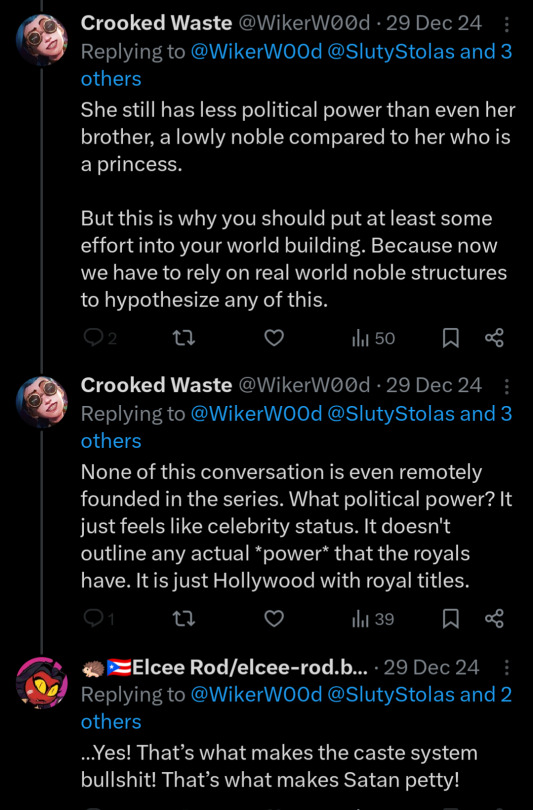
As much as the elites of our world would like to disperse the truth, the reality is that all societies are constructed around power. Who has power, how and why. That is the fundamental basis of every social dynamic from children on a playground to the politicians in our governments. So the very first thing we should even approach in regards to the narrative is how does power work in this universe?
So when I responded to Elcee in the tweet being referenced, I am evaluating power and power structures. Mainly there are two wholly different constructs of power between something like the aristocracy and celebrities.
The closest thing to an aristocracy we have in our modern day are the financial oligarchs of Capitalism. Elon Musk, Jeff Bezos, Bill Gates, etc. They have control everything from how our political parties engage with us to how we think based on the wealth they were born into. They curate our lives behind the scenes in ways that sound worthy of a tinfoil hat, but isn't a conspiracy. The wealthy were threatened in the 1970s by an educated proletariate. In response to our questioning the Vietnam war, the higher education that was once free or at least extremely affordable suddenly became prohibitively expensive.
So much so that only the financial aristocracy could access it. Whereas working class individuals are forced to jump through hoops and prove themselves suitably subservient to the existing power of the oligarchy in the form of scholarship applications, teacher recommendations and application letters before being granted access. This is not a mistake or how it's always been, this is by design.
Meanwhile, Celebrities are not elites. While we think of celebrities as being overpaid and living in luxury, it only takes a glance over at Chappell Roan to see the difference. When Jeff Bezos or Elon Musk or any large corporate CEO walks the red carpet, they are treated as royalty. When celebrities walk the red carpet, they are commodities.
Celebrity is the modern day face of the American Dream. Gone are the days of a single family home and a white picket fence. The boom of content over art, luxury over practicality, and excess over comfort is directly the result of selling to the world the idea of capitalistic success, which just amounts to perpetuating the system of turning humans into money. And for as much money as these celebrities make, it has been proven over and over again that they are just as susceptible to poverty as any other working class individual.
Celebrities are products we buy, and when we stop buying them, they vanish.
Meanwhile the aristocracy, the financial oligarchy, thrives in obscurity.
The difference in power is about who still has it when we no longer see them. And the more invisible and pervasive it is, the more real it is. However one as an individual thinks about the celebrity class, they are simple a different type of specialized tool to the true power behind the scenes.
With that differential in mind, the Goetia function more like celebrities rather than CEOs, and while Elcee fails to see the bigger picture, that subliminally tells the audience that someone with the title of prince, with armies sworn to his allegiance and infinite cosmic power, is no different than a working class joe.
This isn't intentional propaganda, however. It's not her trying to further the agendas of Jeff Bezos intentionally. Just like my other post covering how Medrano tries to excuse cheating, not realizing the only time one can argue such a blanket concept of forgiveness for such a betrayal can only happen when the option of choice is non-existent (ie Divorce is not on the table for reasons outside of the characters’ choices), this is the danger of not engaging with media with your mind turned on. You will innately, no matter how careful someone tries to be, engage with the material through the eyes of the creator.
Celebrities and average people are the same: commodities in the face of real power. But Medrano cannot tell the difference between someone like Elon Musk and his employees. She sees the aristocracy, the ones who were born into a legacy of wealth, as “hardworking average folks”. And if you aren't thinking, you might find yourself implicitly believing that too. Deeper entrenching the power they have over you as an individual and society as a whole.
How we got to where we are in our real lives is mirrored in the media we consume. And that isn't an accident.
#ask and answer#power structures#helluva boss critique#helluva boss criticism#helluva boss critical#vivziepop critical#vivziepop critique#vivziepop criticism#elcee is such a tool
92 notes
·
View notes
Text

Between delivering customized cakes to people who do not linger their eyes upon pieces of insignificant, edible art and being a god, Horus has no time to catch up with his mother when inevitably the phone call comes. Cutting ties with familiar alleyways where thumping club music invites deviant youth, Horus shifts his priorities to the side of the wind of the family that isn't as welcomed at the dinner table. Mother says that her brother is as good as a homeless mortal now and laughs behind her mirror despite her inky mascara running down her cheeks. Horus stands behind her, wearing a thrifted jersey of a soccer team he has no idea about. Isis asks him why he is working human jobs. He misses the sight of his wings, and suspiciously, she narrows her eyes. Horus smiles and backs up to the door, slinging a messenger bag over his shoulder. He answers lovingly that the mother should get ready for the rising sun that grazes the horizon. And before Isis plucks Horus' feathers for being a disobedient child, the eye of the sun pierces the sky and crashes into the world of humans.
For a god, Monday morning is irrelevant. For a god playing human, it is a new and exciting routine. For a god forced to be human, this is the most dreadful day. Uncle Seth has been living under Horus' roof in a city apartment for just over a month now. The energetic nephew likes to be among humans. They are vibrant and modern, they develop things that gods have thought of thousands of years ago and yet they develop their projects like they are novel. Horus does not fit with the other gods in the Egyptian parliament. After the era developed and gods gained new faces, the vintage history gained an edge. Gods became agitated and the gilded hallways of the Field of Rieds did not interests many.
Horus finds this fascinating. He descends to be an architect of minds, a curious adventurer who earns a degree faster than an average genius. Within just two years, he can give literary lectures on mythology and philosophy. His class is full of people who, at first, do not major for interest but out of necessity. By the end of the first semester, Horus beams at the queue of applications and a list of concentrations. Around this time, Seth befalls Horus like a gift of a plague. The gilded and azurite-blessed dethroned Seth and punished him with the human touch. His mother calls him, says to cut Seth off completely. She does not explain why and wishes him dead. Horus furrows his eyebrows and asks the director of his program to let Horus go off-campus on a sabbatical. His students flood his emails with pleas to return but Horus logs out of his account and forgets of his profession altogether.
Wings fold after stretching on the roof of their shared apartment complex. Horus' flat isn't as grand as Isis would have wanted it to be. It has two bedrooms, a living room that overlooks the city's boulevard with tall, paneled windows, two baths, although the master bedroom has a standing, glass shower that also uses a window as a wall. Horus finds it a strange design, so he always takes baths in the guest bathroom. A kitchen has an island and polished countertops. It is easy to navigate and is designed with minimalism in mind. The only glinting trinkets that somewhat remind Horus of his mother's hoarding habit are gifts she brought herself. Memorabilia from her trips, baby pictures, necklaces that Horus will not wear, and letters from different gods questioning his decision to be just a man for a while. A new, peculiar addiction to his apartment is Seth himself. An isolated family that is now bound to be an immortal shell of a mortal life.
Despite the foul moods he always expects, Horus comes back home with a grin straining his lips. His heart races as his wings dissipate, giving way to his human appearance. He is a tall man with dark hair and his bright-blue eyes give out an uncanny resemblance to someone truly perfect. Horus does not notice it; he always ignores anyone who pushes the boundaries of their compliments. The man enters the apartment by pushing his rear into the door, shoving it open while carrying a stack of boxes. There is takeout of spicy cruising on top and deliveries on the bottom. He juggles it toward the kitchen and spreads it all on the island counter.
"Uncle Seth!" He calls, wearing a brilliant glint in his eyes as if he hadn't just worked three jobs back to back. In the morning, he is a research expert for an institution overseas. They let him work remotely but out of courtesy to his temporary guest, he rents a small office just down the block with enough internet to get him through the day. During the lunch break, he delivers cakes from a bakery across the road that marvels at the speed with which their creations are delivered. Their business grows and Horus is allowed a little tip increase. At night, he leaves to be a bouncer and bodyguard for hire at local nightclubs. He is a traveling bouncer, so to speak. Whichever club requires his services, he appears there within twenty minutes of the call. The pay isn't as great but it is pocket change that Horus spends on bills while the main income is given to ensure that Seth's transition from godhood to humanhood is smooth. Horus does not feel the strain of human burdens. He is only happy to help his Uncle.
Horus settles on the barstool at the kitchen island. He hasn't slept in two days, but he hardly notices the strain. Gods do not sleep, although faking a human life resulted in exhaustion before. Horus calls out to Seth again, offering warm food which he lays out on the plates. "I am sorry I could not cook today." He always apologizes for not having the time and ensures to leave Seth a covered plate of breakfast at each dawn.
Growing restless, Horus suspects that Seth is asleep or ignoring his nephew. Filling a plate with aromatic buckwheat with preanning spices and lamb, the man carries it toward his bedroom, which he gave up to the latter. Knocking on the door, Horus enters right after, looking around to catch a glimpse of the fire-headed man. "Uncle Seth, it's late in the afternoon already. Are you awake?" Horus proceeds, walking further. "I brought you lunch. Eat some with me?"
He stops by the tall mirror standing against the wall, seeking Seth in the reflection.

@desertchaos
13 notes
·
View notes
Text
The Lauffen-Frankfurt Experiment of 1891: A Landmark in Electrical Engineering

In 1891, an experiment in Germany transformed the future of electricity. The Lauffen-Frankfurt experiment marked the world's first successful long-distance transmission of three-phase electric power. Stretching approximately 175 kilometers (or 109 miles) from Lauffen am Neckar to Frankfurt am Main, it was a highlight of the International Electrotechnical Exhibition. Key figures included Oskar von Miller, the exhibition's chief organizer; Mikhail Dolivo-Dobrovolsky, who designed the three-phase generators; and Charles Eugene Lancelot Brown, an engineer from Switzerland's Maschinenfabrik Oerlikon, which supplied much of the equipment.

So, what made this experiment groundbreaking? They set up a three-phase AC system powered by a robust 300-horsepower generator, stepping up the voltage from 55 volts to an impressive 8,500 volts for efficient long-distance transmission. This setup, featuring three copper wires, successfully delivered enough power to run a 100-horsepower motor and illuminate 1,000 incandescent lamps at the exhibition.
What is three-phase? Think of it like a three-lane highway. With just one lane (single-phase), you can only have one car (or current) at a time, which leads to traffic jams. But with three lanes, multiple cars can move smoothly side by side, ensuring a steady flow. This means electricity can be delivered more efficiently and with less flicker, making it ideal for powering everything from lights to heavy machinery. While it might seem logical to add more phases for even better efficiency, three-phase systems are often the sweet spot. They provide balanced and constant power delivery, making them highly efficient for most applications. Adding more phases increases complexity without significant efficiency gains—like a six-phase system that might reduce ripple but complicates design, equipment, and maintenance.
The significance? This experiment demonstrated that electrical power could be transmitted over long distances with much less energy loss than DC systems. It achieved an impressive 75% efficiency, showcased the advantages of a three-phase system—like smoother power delivery—and highlighted the importance of voltage transformations for effective transmission. Essentially, they figured out how to make electricity travel like a well-coordinated relay race, where each runner (or phase) keeps the momentum going.

After the experiment, discussions arose about who truly invented the three-phase system. Charles Brown, a key figure in the German experiment, stepped up to give credit where it was due. In a letter published in The Electrical Review on February 12, 1892, he acknowledged the significance of the three-phase system while emphasizing that the main goal was to prove the feasibility of safely transmitting high-tension currents over long distances. He noted that although the three-phase current added complexity, its benefits for powering multiple motors simultaneously were worthwhile. Most importantly, he stated, “The three-phase current as applied at Frankfurt was due to the labors of Mr. Tesla and will be found clearly specified in his patents.”
Brown specifically referenced Tesla's patents filed on October 12, 1887: Patent No. 381,968 for an "Electromagnetic Motor" and Patent No. 382,280 for "Electrical Transmission of Power," which detailed a three-phase power system. These patents were foundational to the technology used in the Lauffen-Frankfurt experiment.
Brown’s acknowledgment highlights Tesla’s innovative spirit, which transcended borders and spurred advancements in Europe. His patents laid the groundwork for the three-phase current used in this experiment.
Tesla's patents weren’t mere formalities; they were foundational blueprints for modern electrical systems, including designs for polyphase AC systems that predated the Lauffen-Frankfurt experiment by several years. Brown's emphasis on the significance of Tesla's patents for the three-phase current demonstrated that many who discredit Tesla, even in today's debates, overlook their importance. This highlights Tesla's crucial role in developing the technology that both the German experiment and today’s innovations depend on.
In short, the Lauffen-Frankfurt experiment marked a pivotal moment in electrical engineering, proving the viability of long-distance AC power transmission and laying the foundation for today’s electrical grid. While it showcased German ingenuity, it also highlighted the collaborative nature of scientific progress, with Tesla's earlier contributions illuminating the path forward. The interplay between his theoretical innovations and the practical applications of this experiment illustrates how technological progress often builds on the brilliant ideas of others.
47 notes
·
View notes
Text
My sperm donor, literally the first chance he gets to see me as soon as he's back: So what's the update on the job hunting? Me:

Me: I am fine and normal
Also me: not getting hired anywhere despite having a degree and I turn 26 next year so I need insurance
Also also me: wildly depressed due to said lack of job hunting success and abusive father's lack of understanding
Also also also me: still stuck living in abusive parent's house, again, due to said lack of full time work
Also also also also me: constantly drowning in tasks beyond work and no longer know how to relax
Also also also also ALSO me: just dodged getting COVID from my mother two weeks ago by fleeing her house, but now my older brother has COVID and there's nowhere for me to go
Also also also also also ALSO ME: All plans to treat myself since abusive father isn't in the country are canceled due to brother's COVID and my potential exposure
ALSO ALSO ALSO ALSO ALSO ALSO ALSO ME: STAYED UP FOR TWO HOURS PAST MIDNIGHT TROUBLESHOOTING WIFI BECAUSE THE ISP SAID THERE WERE NO OUTAGES AND I NEED WIFI TO WORK FROM HOME, ONLY FOR THE ISP TO ANNOUNCE AN OUTAGE ONLY AFTER I CALL MY ABUSIVE PARENT ON VACATION
Me: I AM FINE AND NORMAL I AM FINE AND NORMAL
#if i make it to the end of the year i'll be amazed and maybe even slightly disappointed#dylawa rambles#dylawa rants#delete later#an outsider might see this interaction and think “gee why is asking for updates so bad”#I'd like to preface my points by saying I HAVE a job. It's part time with no benefits but I AM working#I'm not being 'dead weight' (which is a cruel term but whatever)#nevermind he takes half my monthly income for rent even though he SO does not need it#first of all he only ever bugs me about job hunting after asking me out to lunch so now i don't ever want to go anywhere to eat with him#or even worse right before i start work or during so i'm biting back tears for like an hour while making phone calls and leaving messages#it doesn't feel 'nice' it feels like a trap#it's NEVER any other time it's always those two-- either extremely inconvenient or leaving me with nowhere to run#second he thinks that i should just be trying to get an 'entry level' job in my career (animation/graphic design/film)#and when i tried to explain I am and they want 2 years professional experience he talked over me#nevermind the mass layoffs and the fact companies only want people who have already been employed somewhere in the industry anyway#can't get a job because i haven't had an internship; can't get an internship because i'm not in college anymore#I still don't regret keeping the same job throughout nearly the entirety of university but that's WHY i never got an internship#third this man has basically run his own (shitty) company his entire life and doesn't understand the modern struggle of job hunting#he SAID he 'doesn't blame me' for not having anything and I'm 'always welcome here' but I don't believe that for a second#why the fuck else would he be so persistent as to bug me every week or other week#Trust me bitch I want to leave probably more than YOU want me to leave#despite my savings going anywhere without full time work that barely covers half rent with a roommate is stupid#I have gotten THREE interviews in six months (eight or nine if you count the applications I was sending in college)#the next one is tomorrow and it isn't even in fucking animation or even graphic design it's in ACCOUNTING#talking to me about it isn't going to change anything it just makes me feel like a failing piece of shit#but hey fuck me for getting upset right? he's 'just asking' he's 'just trying to help'#so unbelievably out of touch and narcissistic while hiding behind the guise of 'care'#if i'm gone by the end of the year the letter will be all about YOU and how i could never be honest with you#how living with you was basically 24/7 customer service faking a smile and friendliness#and how I loathed you more than anyone or anything on the planet for YEARS before I finally checked out
1 note
·
View note
Text
How Canadian Licensing Systems Protect Against Identity Fraud
Identity fraud is a growing concern worldwide, and Canada is no exception. As licenses increasingly serve as key forms of identification for banking, travel, and government services, Canadian licensing systems have had to evolve with robust security measures to protect against identity fraud. Whether you are applying for your first license or renewing an existing one, it’s important to understand how these systems work to safeguard your personal information.

1. Advanced Physical Security Features
Modern Canadian driver’s licenses are embedded with multiple physical security features designed to make them extremely difficult to forge or tamper with. These include:
Holographic overlays: Special images that appear when the license is tilted, making duplication extremely difficult.
Microprinting: Very tiny text that is not visible to the naked eye but detectable under magnification, preventing easy reproduction.
Ghost images: A faint second image of the license holder that helps prevent photo swapping.
Raised lettering: Some jurisdictions use raised text that you can feel, adding another layer of protection against fakes.
These built-in technologies make it easy for authorities and businesses to quickly spot a fraudulent license during routine checks.
2. Digital Data Encryption
Canadian licensing systems now store driver data in encrypted databases, making unauthorized access to personal information extremely difficult. When information is transferred — such as when police scan your license or when you renew online — the data is encrypted both in transit and at rest. This ensures that even if someone intercepts the data, it remains useless without the decryption keys.
3. Stringent Identity Verification at Issuance
Before issuing a license, provincial and territorial licensing authorities conduct rigorous identity verification checks. Applicants must present multiple pieces of identification, including:
Proof of legal status in Canada (passport, PR card, visa).
Proof of residency within the province.
Secondary documents such as a birth certificate, citizenship card, or utility bill.
In many cases, cross-checks with federal databases (like immigration records or citizenship status) ensure that the applicant is who they claim to be. Newcomers may also face additional document checks to confirm their eligibility before a license is issued.
4. Real-Time Photo Comparison and Biometrics
When you renew your license or apply for a new one, your photograph is compared with existing photos on record using facial recognition software. This system helps detect cases where someone might be trying to fraudulently assume another person’s identity. In the future, more provinces are planning to expand the use of biometrics, such as fingerprints or iris scans, to further strengthen identification measures.
5. Ongoing Monitoring and Alerts
Canadian licensing systems do not just verify identities at the point of issuance — they continue monitoring afterward. If a license is reported stolen, lost, or involved in suspicious activity, it can be flagged in the system. Law enforcement agencies and border officials have real-time access to these databases, making it harder for stolen or fraudulent licenses to be used undetected.
Additionally, provinces encourage drivers to immediately report lost or stolen licenses to prevent identity theft and ensure the system remains secure.
Canadian licensing authorities are committed to staying ahead of fraudsters by continually updating security features and identity verification processes. Thanks to multi-layered protection — from physical security measures to real-time monitoring — Canadians can trust that their licenses remain a strong line of defense against identity fraud.
For step-by-step guidance on obtaining your driver’s license safely and staying informed about new ID requirements, visit LicensePrep.ca. Their resources make navigating the licensing process simple and secure!
#IdentityFraud#CanadianDriversLicense#LicenseSecurity#IDVerification#LicensePrepCanada#FraudPrevention#DrivingInCanada#Secure
4 notes
·
View notes
Text
Letters from Watson, the Engineer's Thumb
Crimes in Context: Counterfeiting, circa 1889
What coins were the Stark-Becher gang trying to make, anyway? And did they actually need a person squishing hydraulic press to do it?
Most of the cash in circulation in Victorian England would have been coins, so it's time to refresh our memories on what they all are, since I last addressed currency smaller than a pound in The Man with the Twisted Lip. We will be restricting ourselves to denominations that the Stark-Becher gang may have been minting, based on the comment that the hydraulic press was necessary to make coins that were previously minted in silver.
Imperial Currency Definitions
Pound/Quid/Sovereign: Not applicable, the Sovereign coin is gold, but it's the base unit of the currency we're dealing with. It also would have been hard to pass as genuine just because it's a large denomination - the era's equivalent of a hundred dollar bill. Indeed, our Bank of England inflation calculator returns a modern value of £107.
Crown: Five shillings / a quarter pound. Represented by a silver coin. Probably the largest coin you'd make change for without being annoyed by it.
Shilling: 1/20th of a pound. A silver coin. Crowns and Shillings are our most likely candidates, as they're in common use in 1889 and is the kind of cash an average man might have on hand. I personally think shillings are the most likely coin to counterfeit, as a lot of accounting of people's wages, expenses, etc. in this time period is written as pounds / shillings / pennies (L/s/d) and silver pennies (And their horrible spawn of sixpence, twopence, etc) are probably not worth the effort. Also, while there were silver pennies in circulation, the fact that things like silver twopence were minted for maundy money makes the timeline and consistency of their minting beyond my pay grade as a blogger. And probably confusing for a coiner to get exactly right, given the payoff. Hydraulic press:
Modern (paper*) money is printed with several aspects that make it harder to reproduce: the exact fiber content of the paper, the multi layered and detailed design (with parts that can only be seen under UV light, parts that can only be seen with a magnifying glass, etc.), the embossed parts of the print design, and the exact chemical components of the ink can be analyzed to see if a note is authentic. The ink in US dollars also contains a smattering of heavy metals that aren't great for human health, so I don't recommend consuming money in any way - don't lick it, don't snort things off it, don't put it in your blender for a science fair project. It would be chemically somewhat dangerous to counterfeit modern currency at home, assuming you got anywhere close to the right ink.
*Some countries use polymer, but same difference. It will kill your blender, though.
The Victorians did... none of that, really. The idea of designing money to be harder to fake was already around, but metal coins can only be produced to a certain degree of precision with the tools that were available in the 1800's: you essentially heat a disk of the correct metal (a blank) and press it with a stamp. The hydraulic press would, of course, squash blanks between two plates of stamps precisely, and with great force.
Both silver and gold have relatively low melting points (under 2,000 degrees F / close to 1,000 C) and are malleable at lower temperatures than the iron or steel of a hydraulic press. Silver amalgam (a silver/mercury alloy) has an even lower melting point, so it would be even easier to fit to a mold.
Essentially, anybody who knew much about molding metal and could get a precise-ish model of the coin in question would make pretty convincing money. A hydraulic press large enough to fit three grown men between the plates of may have been overkill.
22 notes
·
View notes
Text

InDesign Resume Template: Land Your Dream Job with ContestDesign’s Modern & Minimalist Layout
Navigating the job hunt can feel overwhelming, especially when everything hinges on that one crucial document: your resume. In today’s crowded job market, a plain or hastily put-together resume won’t cut it. What you need is a tool that sets you apart right from first glance. That’s where a professionally designed resume template becomes invaluable. Picture showcasing your skills and experience with a sleek, minimalist layout that exudes polish and professionalism—even before a recruiter reads a single word. The creative minds at ContestDesign have crafted exactly that: a standout Adobe InDesign resume template complete with a coordinated cover letter. It’s designed with precision to help you leave a lasting impression. Curious to see how it can transform your application?
Download here.
Subscribe to the podcast on Spotify, Apple Podcasts, or Amazon Music.
Follow WE AND THE COLOR on Facebook I Twitter I Pinterest I YouTube I Instagram I Reddit I ChatGPT I Podcast
#design#graphic design#resume#resume template#adobe stock#adobe indesign#resumes#cv#curriculum vitae#graphics#download
3 notes
·
View notes
Text
Split Decisions
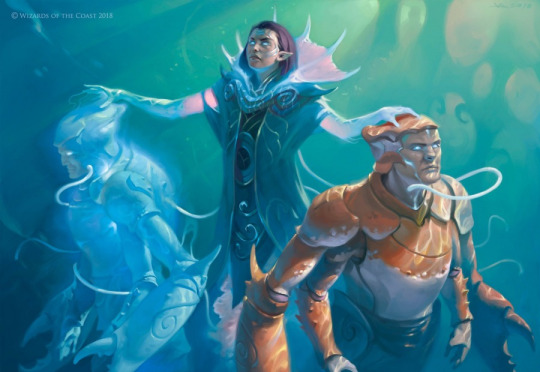
Choices matter all the time—and that includes the choice of card options. Sometimes you want to include a card that can go in either side of your deck depending on your choices, and sometimes those modes are definitely designed more for the limited crowd. What on earth am I talking about? Well, without splitting hairs, let's take a look into the past and check out some halves for this whole week..

Design a split card based on ANY* ONE previous mechanical precedents of split cards, which is as follows:
Invasion splits (uncommon, different colors, same type, related "&" name)
Dissention splits (rare/uncommon, multicolor cards that share one color, same type, related "&" name)
Dragon's Maze fuse splits (uncommon color pair OR rare multicolor-with-shared-color cards, same type, related "&" name, inclusion of Fuse mechanic)
Amonkhet/Hour of Devastation Aftermath splits (uncommon/rare cards with Aftermath mechanic & frame, can be different types, monocolor on both sides, "X to Y" name)
Guilds of Ravnica/Ravnica Allegiance splits (uncommon/rare split, two-color hybrid on one side & same multicolor on the other, can be different types, first three letters are the same on both sides)
Modern Horizons 2 splits (uncommon, same monocolor, different type, related "&" name)
Murders at Karlov Manor splits (uncommon, both sides hybrid with one shared color, can be different types, related "&" name)
What I'm excluding:
The Planar Chaos vertical cycle (because you'd be designing three cards, and I don't want that headache this week)
Doctor Who story cards (not that they're bad, but they're not about a mechanical identity)
WWWWW (No.)
What I'm looking for:
In the card name/flavor, a clever application of whatever world you choose (doesn't have to be its first appearance!) that's still sensible even if you have to stretch a little. Maybe a "with" or an "or" instead of the usual "&" name, or lingo that's a little more contemporary?
In the mechanics, a demonstration of how split cards affect limited both with their speed, castability, general archetype, etc. What decks want to play these cards, and why? How do they function on their own at the rarity and complexity you chose? Is it functional? Is it legible?

Anyway, see you later. I gotta split.
@abelzumi
>> SUBMIT to the INBOX
>> DISCORD and CHAOS
12 notes
·
View notes
Text
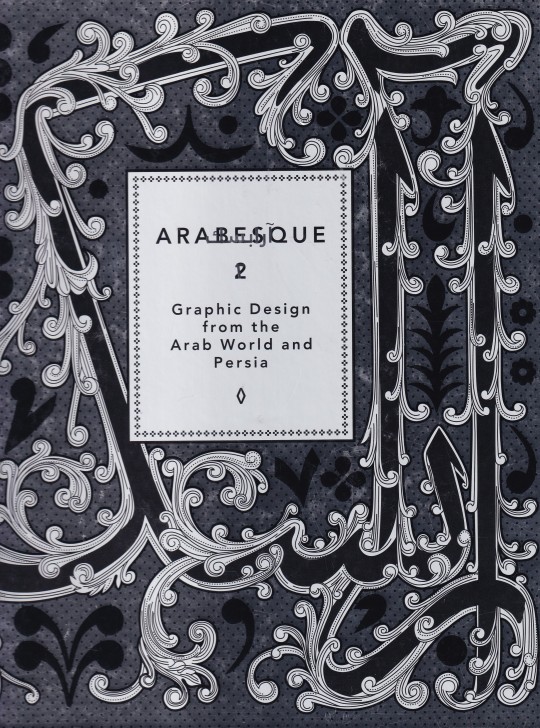
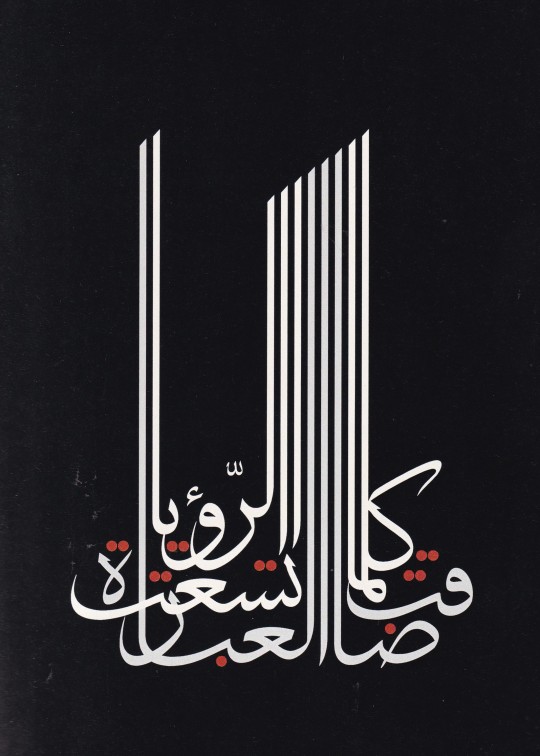



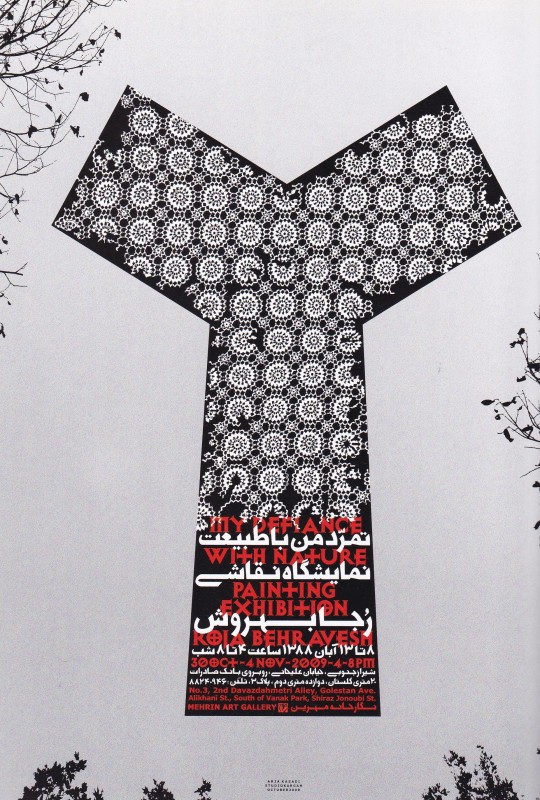
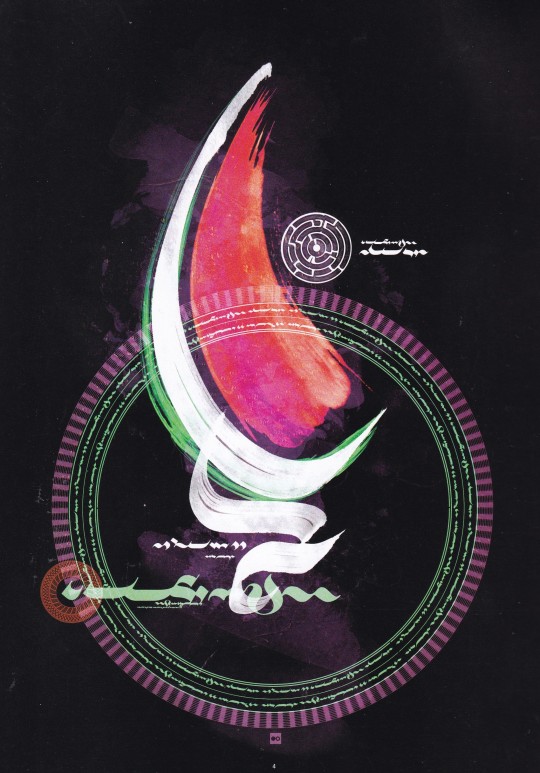

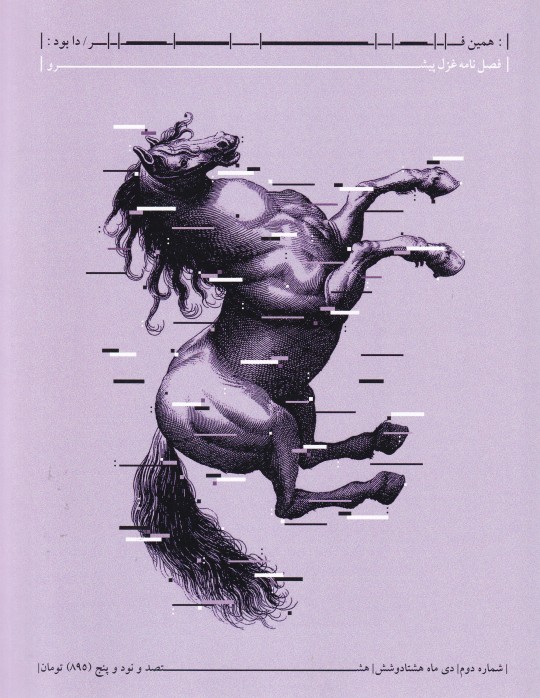
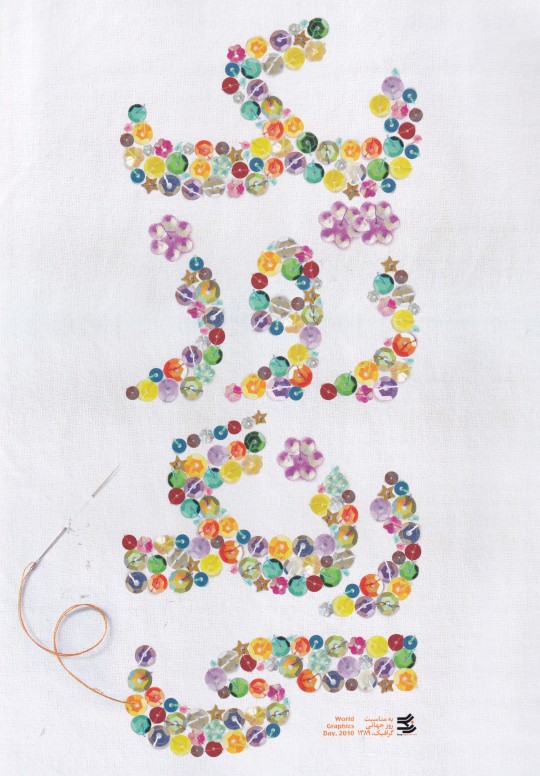
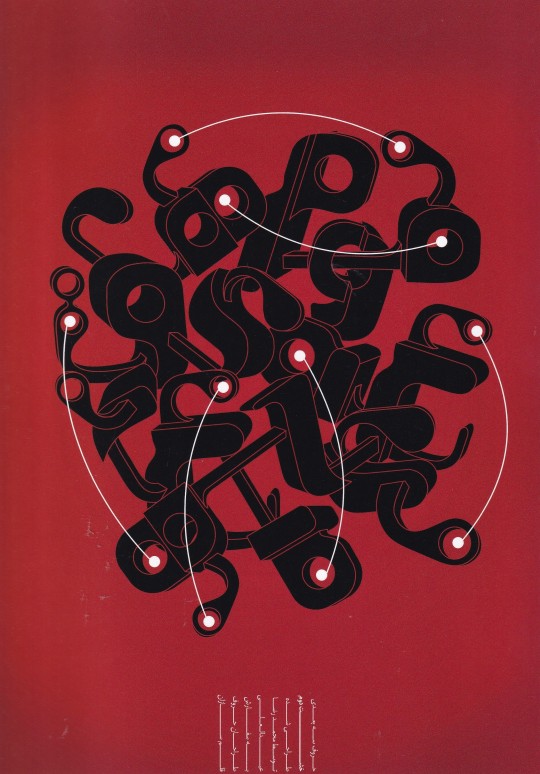
Arabesque 2
Graphic Design from the Arab World and Persia
Edited by Eps51 - Ben Wittner and Sascha Thoma
Foreword by John Martin and Salma Tuquan
Die Gestalten Verlag, Berlin 2011, 208 pages, 24,5x29cm, ISBN 978-3-89955-330-7
euro 40,00
email if you want to buy [email protected]
Cutting-edge graphic work from the Arab world and Iran that is emblematic of the cultural emancipation of this entire area. The wave of protests that started this year in Tunisia, Egypt, Yemen, Libya, and other countries have made it clear just how much the Middle East is searching for a new identity. Young designers in the region are playing a part in this movement by increasingly emancipating themselves creatively. In their work, they are charting their own compelling course between local visual convention and a modern international style. Arabesque 2 documents the potential of this current creative emancipation in the Arab world and Iran. The book features examples of recent innovative and groundbreaking design work that is inspired by the richness of the region’s visual culture. Given the important role of calligraphy in the Middle East, Arabesque 2 focuses on typography. The book presents a wide range of Arabic fonts and typefaces inspired by traditional calligraphy. These are accompanied by a rich selection of applications. Select examples of design and graffiti serve as powerful demonstrations of how text can be used illustratively. This work is particularly relevant to those creating street art and poster design. Arabesque 2 also features graphic design, logos, Edited byial design, and illustration by young designers and activists from Egypt, Iran, Saudi Arabia, Jordan, Lebanon, and the United Arab Emirates. Regardless of the location and nationality of their creators, all of the examples included in the book combine modern design with the traditional, letter-based canon of Arab forms in striking ways. The book’s preface is written by John Martin, co-founder of Art Dubai. Additional texts and interviews describe the environments in which the featured designers and artists work.
09/01/24
#Graphic design Arab World#Graphic design Persia#typography#street art#graphic arts#fashionbooksmilano
25 notes
·
View notes
Text

Study shows how adding impurities to thermoelectric materials impacts their mechanical properties
According to scientists, waste heat, which enters the environment and remains unused, accounts for more than 70% of global energy consumption losses. With the help of thermoelectric materials—special semiconductors—the dissipated heat can be converted into electricity. Thermoelectric materials can also be used to design cooling devices, which reduce energy consumption in domestic and industrial applications. Searching for these materials is one of the key tasks of modern materials science. A team of scientists from Skoltech, the Emanuel Institute of Biochemical Physics RAS, as well as other leading scientific organizations in Russia and Israel studied how adding impurities to lead telluride (PbTe), a thermoelectric material, can affect its mechanical properties and extend the service life of a thermoelectric generator. The article has been published in Applied Physics Letters.
Read more.
#Materials Science#Science#Thermoelectric#Impurities#Mechanical properties#Lead telluride#Lead#Tellurium#Skoltech
17 notes
·
View notes
Text
SHINY COLORS FASHION ANALYSIS: Yuika Mitsumine (三峰結華)

"I'm an idol… it feels kind of strange…"
This is a project analyzing and taking a look at the fashion design and application in the multimedia series, The IDOLM@STER: Shiny Colors. This section is about the eccentric and lively subculture girl of the series, Yuika Mitsumine! If you want to jump to a specific section, go here!
(This is a reprint of my thread on Twitter. I put it on Tumblr for easier reading and for archiving purposes. Enjoy!)
-----
INTRODUCTION
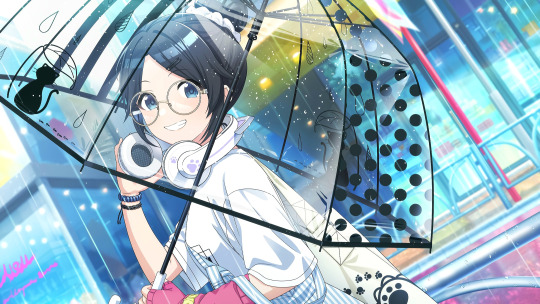
“Yuika is a first-year college student, a subculture girl with a free-spirited, light-hearted, & somewhat elusive personality. She can talk to people that she meets for the first time easily and has a deep knowledge of idols. Sometimes she has a serious expression on her face.”
---
Profile
Age: 19
Birthday: January 16th
Height: 158 cm
Weight: 44 kg
Blood Type: O
Hometown: Fukushima
Hobbies: Watching idol lives, cameras, anime, games, reading
Special Skills: Studying & can be recognized by her oshi as quick as possible
CV: Shio Kisui
---
Before starting the analysis, I would suggest if you haven’t already, read her W.I.N.G. (introductory) commu (through the broswer game's English patch or on YouTube). If you don’t play the game, I would listen to her image song and read the lyrics to get a better sense of her character.
-----
STYLE BREAKDOWN
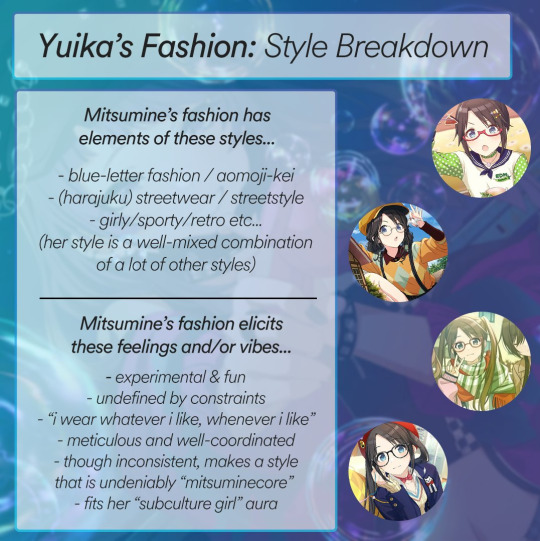
Consisting of many different fashion elements, Yuika’s personal fashion is easily identifiable though hard to define. Labelled a “subculture girl,” her open-minded personality leads Yuika to incorporate various styles into her own while still looking unique & fashion-forward.
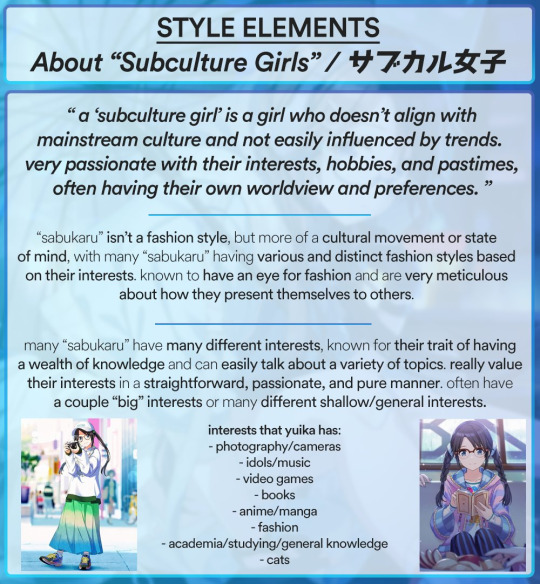
Before diving into her fashion, I’ll expand on her label as a “subculture girl” using this graphic. “Sabukaru” is more of a cultural movement rather than a fashion style, with personal fashion and expression being varied amongst members dependent on their hobbies.

Yuika’s fashion is mainly inspired from aomoji-kei or blue letter style, explaining her versatile & unique wardrobe. Formerly used as a catch-all for Harajuku fashion, it describes cute & casual fashion that doesn’t appeal to men with a motto of “wearing what you want to wear.”
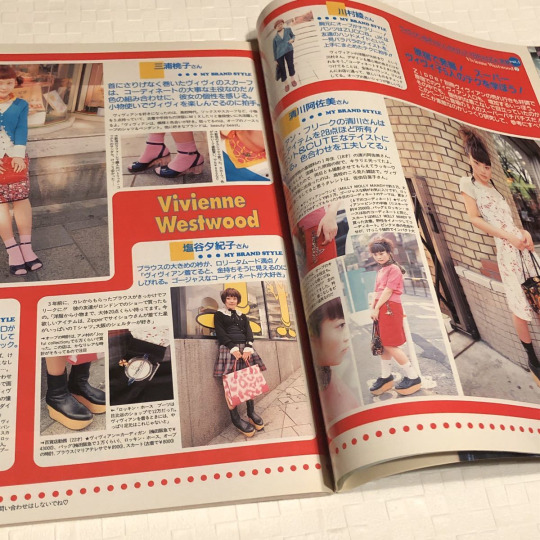
Popular aomoji-kei magazines like Zipper, FRUiTS, and KERA! covered many different styles and brands, inspired by streetsnaps in Harajuku. The insides featured many experimental and exciting coordinates as sort of a counter against mainstream fashion and the male gaze.


Though all the magazines above have ceased production due to a change in audience and trends, the Aomoji-kei movement still lives on through brands, digital newsletters, and the thriving fashion culture of Harajuku. Also, magazines like mini and SO-EN are still around today.
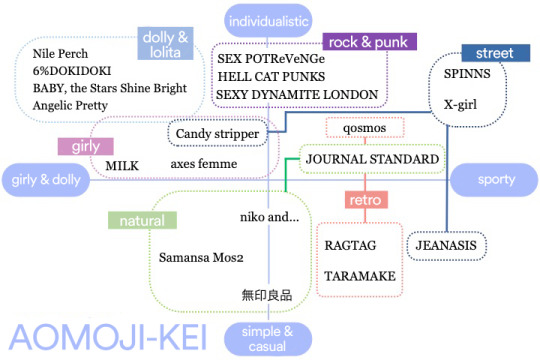
This diagram from Asahi Sato shows that Aomoji-kei is split into many styles ranging from simple & girly to individualistic & sporty. The next few tweets identify major groups that Yuika’s fashion is drawn from, but keep in mind there is heavy overlap & won't include all of them.
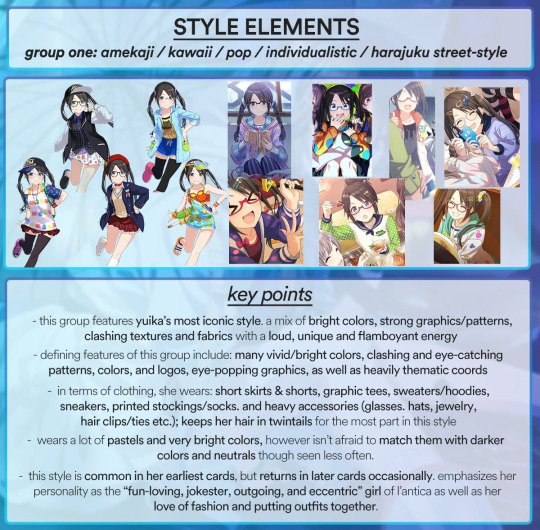
Group 1 of her various styles I dub her “original style.” This style is highly featured in her default outfits and many other early cards of hers. Heavily influenced by the kawaii, amekaji, pop, & original harajuku street-style trendsetters, this style is very fun and eccentric!
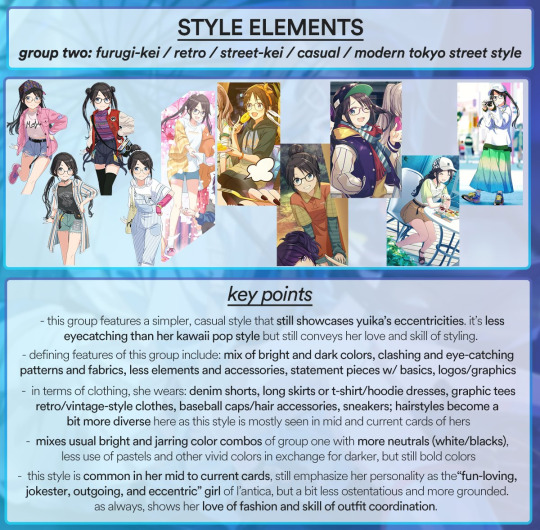
Group 2 is less showy than Group 1, with a more conventional elements that reflect modern street style, but still show Yuika’s eccentricity and skill of outfit composition. Appearing after the peak of her “kawaii pop” style, it’s a more casual and laid-back style comparably.
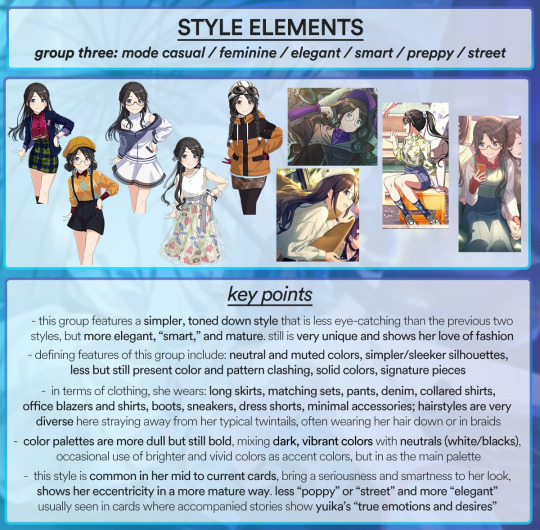
Group 3 is the most mature, elegant, and “smart” pool of looks that Yuika wears. Featuring a mix of solids and simple patterns, dark and neutral colors, and elements of the mode casual and feminine styles, it’s a group that shows off a more simple but modish side to her.
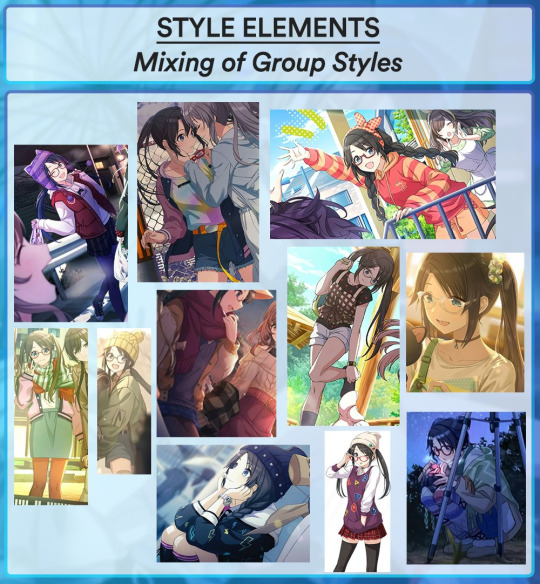
Though I categorize her styles in groups, Yuika’s style can’t really be categorized. They bleed between different groups or don’t fit into any at all. These groups were made for people to identify her weared trends, but compartmentalizing her style doesn’t really fit her at all.
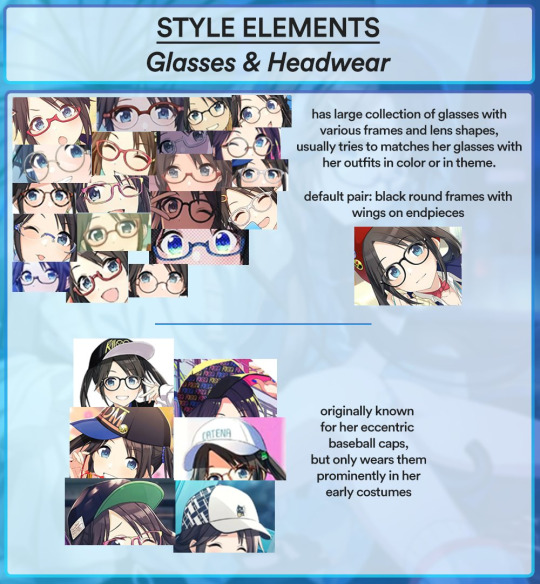
Now I would like to talk about some common elements of Yuika’s fashion that appear, regardless of style inspiration. The most famous are her trademark glasses and baseball caps, customized so they fit any look she wears.
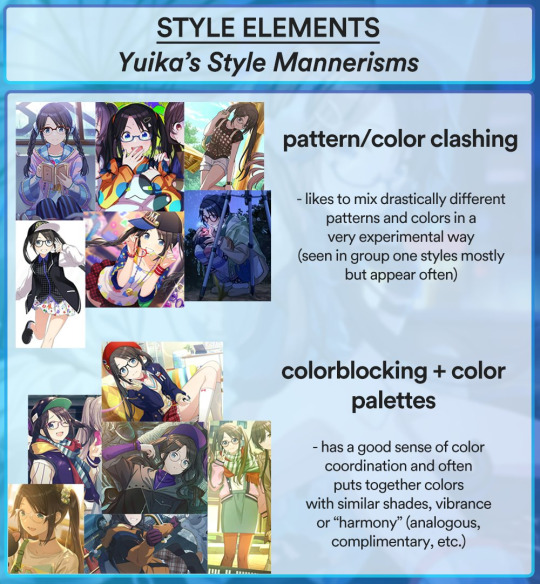
Two more essential elements of her personal style are her frequent & variable use of pattern & color clashing and colorblocking & color theory in outfit composition. These being mainstays in her fashion make it as versatile and interesting as it can get.
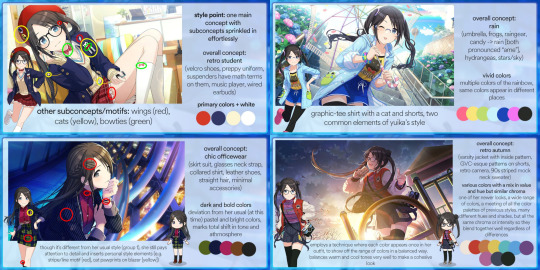
This tweet shows four outfits and how she applies clashing, color theory, and conceptual importance to make them exciting, unique, & varied. Though a wide range of style influences and colors are used, all these outfits are “Yuika-core” connected by common styling values.
The above section was written inspired by a blog talking about Yuika’s fashion sense, so I would like to give them thanks for well-written another perspective on her style.

No need to talk about her fashion’s color palette as she doesn’t limit her fashion to a specific group of colors, but her image color is a medium-blue like sky or rain. For such an outgoing personality, her image color has a weight to it which we will cover in the next section.
-----
STYLE ANALYSIS

Yuika was scouted by Producer while taking shelter from the rain, coming back from an idol-merchandise haul. Upon seeing her smile and how much she loves idols, he asks her if she wants to become an idol.

She finds it hard to believe she actually got scouted and thinks it’s some kind of elaborate prank, but she accepts the offer and becomes an idol. It’s later revealed that she wanted to become one due to being curious about the world of idols and wanting to be admired.
To fans and the members of L’antica, Yuika acts as the moodmaker and jokester of the group, always having a huge smile on her face and constantly cracking jokes and making merry. She’s the initial glue that bonds L’Antica together and always makes sure everyone is feeling happy.
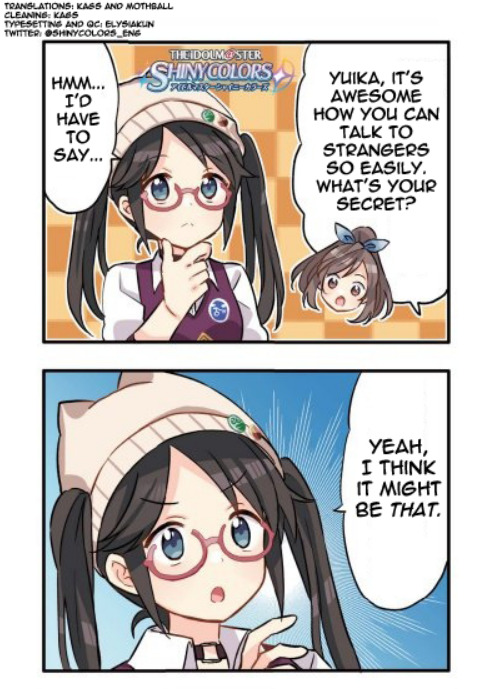
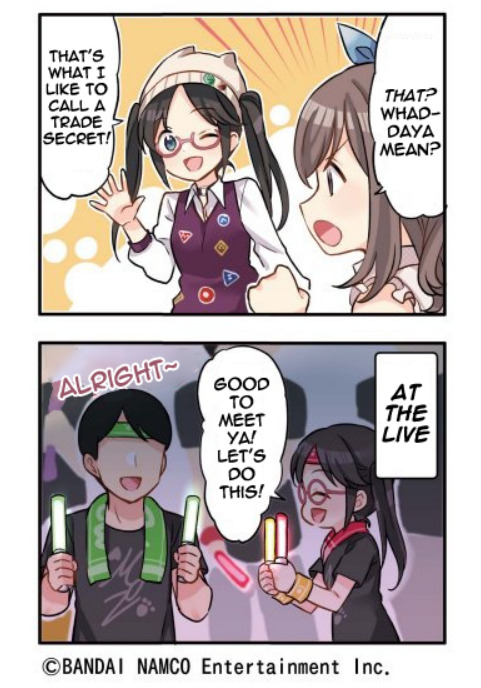
As to why she’s so outgoing, it’s revealed that it comes from interacting with other idol otaku at live shows but she keeps this a secret from most people. She is a diehard idol fan of many female groups, collecting merch and going to handshake events.

In fact, most people know that Yuika is a “subculture” girl and has many public interests like fashion, photography, and manga. However, she keeps her insane idol hobby under wraps, even hiding merch from the L’antica girls when they visit her place.
One special quirk of Yuika is her high degree of reading the atmosphere and sensing the mood of the room quickly. In her Landing Point, she reveals she keeps her otaku hobbies a secret because when she would talk to her friends about anime, she felt the vibe get uncomfortable.

Yuika is really sensitive to the vibe getting rancid in fact, feeling uncomfortable if everyone isn’t feeling content. She will do anything to make everyone feel comfortable, even putting her own feelings on the back burner if she feels it would unnecessarily complicate things.
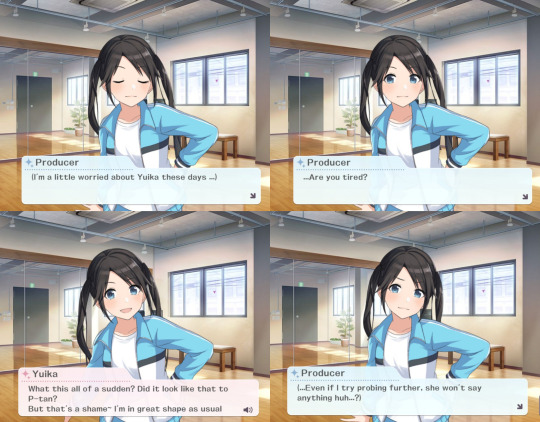
Even with the Producer, she is known for hiding her true feelings and masking it with her outgoing personality and deflecting issues that bother her, burdening herself instead. She doesn’t like to show signs of weakness and keeps a well-hidden distance from most people.
In cards like “NOT≠EQUAL,” “Dizzy Dizzy,” and “No Life,” she is also shown to be very self-critical and barrages herself with deprecating comments. She only discloses these feelings with Producer, as she feels bad troubling anyone else with her “trivial” problems.

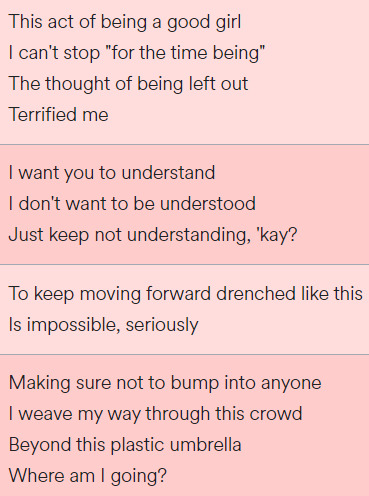
Her image song, “Plastic Umbrella,” discusses her habit of hiding who she really is and keeping a boundary from most people to “protect the peace.” Not wanting to “bump into anyone” but also “wanting someone to find her,” this paradox of personality is everpresent.
-

Though her personality is somewhat hard to explain, her fashion really eludicates who she is as a person. At first glance, her style is very eyecatching and eccentric, but not in an intimidating way. It’s very fun and doesn’t take itself too seriously in a way that is amiable.
However, if you look closer you’ll see that a lot of care and meticulous detail is put into her outfits. The colors, patterns, silhouette, composition, mood, atmosphere, accessories, clothes, etc. are all specifically picked to fit each other in a way that is incredibly skilled.
As said by others, Yuika has an incredible eye for detail with people, but this expands to her fashion as well. She is good at studying, remembering, and applying knowledge to situations, seen in how variable her fashion influences are but still maintaining a cohesive style.
Personally, I would describe her “fun” fashion as an mechanism of lowering others’ guard similar to her outgoing personality, masking her real feelings. Not to say that her fashion is ingenuous, but it helps make other people feel at ease regardless of intention.

Yuika’s style evolution is hard to spot, but major style influences she wears change with time. Out of all the Shiny Colors girls, Yuika definitely has the most unique take on fashion & the fact that it’s also a commentary on herself (both shown and hidden) is the cherry on top.
-----
This is it for Yuika Mitsumine!
If you liked this thread, check out my Twitter and give me a tip on Ko-Fi so I can do more things like this with other idol series! Thanks for reading <3
Next section: Kiriko Yukoku
8 notes
·
View notes
Text
Helvetica: A Deep Dive into the World’s Most Ubiquitous Typeface
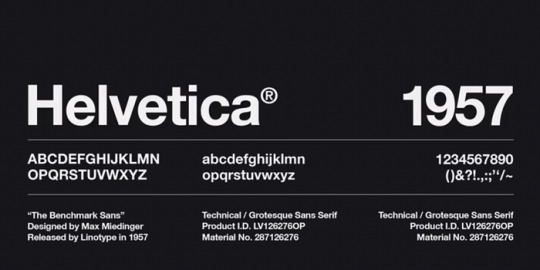
Helvetica, a typeface synonymous with clarity and modernity, reigns supreme in the world of design. Its widespread use, from iconic brand logos to everyday signage, speaks volumes about its enduring appeal and versatility. This blog post will explore the origins, characteristics, and lasting impact of Helvetica, tracing its journey to becoming a global design phenomenon.
Swiss Origins and Design Philosophy
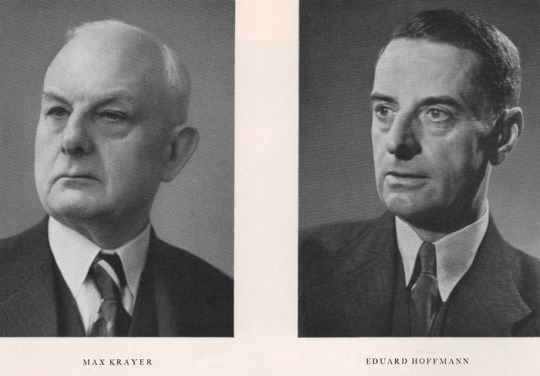
Helvetica emerged from the heart of Swiss graphic design in 1957, born from the collaboration of Max Miedinger and Eduard Hoffmann at the Haas Type Foundry. Switzerland, renowned for its precision and efficiency, provided a fertile ground for this revolutionary typeface to flourish. At its core, Helvetica embodies the principles of the International Typographic Style (also known as Swiss Style), which emphasized cleanliness, readability, and objectivity. This movement embraced the use of grids, sans-serif typefaces, and asymmetrical layouts to create balanced and harmonious designs.
The Making of a Masterpiece: From Neue Haas Grotesk to Helvetica
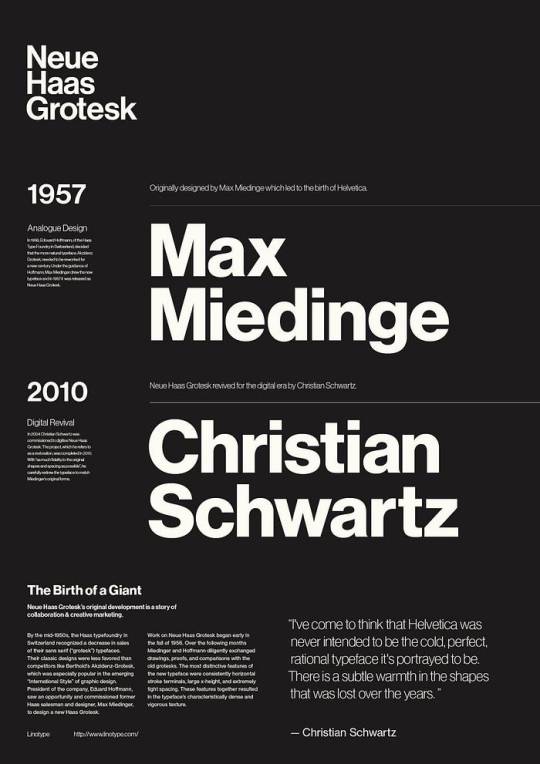
Helvetica’s journey to becoming a global icon involved a series of pivotal moments. Initially christened Neue Haas Grotesk, the typeface was a refined interpretation of the earlier Akzidenz Grotesk typeface. In 1961, Stempel, the parent company of Haas Type Foundry, strategically renamed it Helvetica, meaning “Swiss” in Latin, to broaden its appeal in the international market. This decision proved to be a masterstroke, as Helvetica rapidly gained traction worldwide.
Anatomy of Helvetica: Decoding its Visual Language
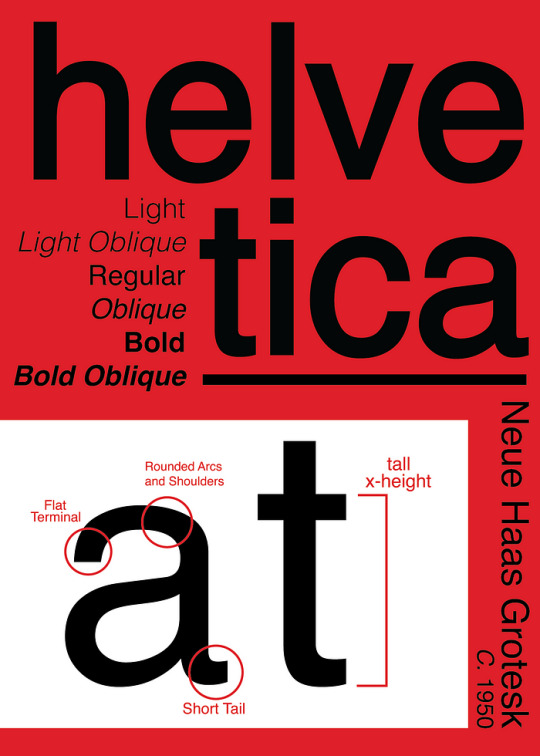
Helvetica’s enduring allure lies in its meticulously crafted letterforms and distinctive characteristics. Its simple, geometric shapes and uniform stroke widths contribute to its exceptional legibility. Key features include:
Minimal stroke contrast: The difference in thickness between the thickest and thinnest parts of a letterform is subtle.
Horizontal and vertical cut-offs: The ends of strokes are cut straight, creating a clean and crisp appearance.
Tight spacing between letters: Letters are set close together, resulting in a compact and unified look.
Large x-height: The height of lowercase letters is relatively large, further enhancing readability.
Closed apertures: The enclosed spaces within letters like ‘a’, ‘e’, and ‘o’ are relatively small.
These carefully considered details work in harmony to create a typeface that is both aesthetically pleasing and incredibly functional.
Helvetica’s Enduring Legacy: A Testament to Timeless Design
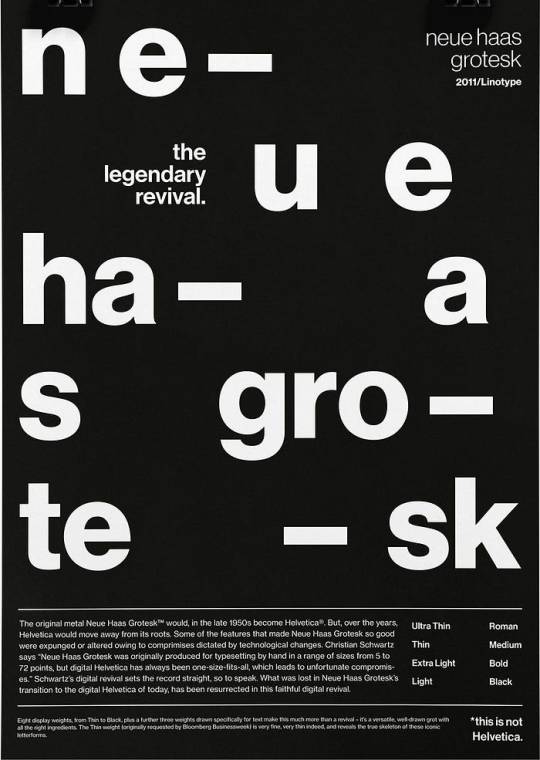
Helvetica’s influence on the world of design is undeniable. Its neutrality and versatility have made it a go-to choice for a wide range of applications, from corporate branding to transportation signage. Iconic brands like Knoll, American Airlines, and Panasonic have all harnessed the power of Helvetica to communicate their brand identities effectively. The typeface’s presence extends beyond the corporate world, finding its way into film title sequences (Goodfellas, Split, Alien) and even becoming the official typeface of the New York City subway system. Helvetica’s ability to transcend cultural boundaries and resonate with audiences worldwide is a testament to its timeless appeal. As Wim Crouwel, a renowned typographer, aptly stated, “The meaning is in the content of the text and not in the typeface, and that is why we loved Helvetica very much.”
4 notes
·
View notes
Text

After the Spring’s End Concert comes to a close, royal families return to their apartments with an ominous letter awaiting them. Boasting the seal of the Tsarina Stasov of Russia, the heavy handed letter reveals the work accomplished by the reserved kingdom of Russia. With news of The Reckoning reaching every corner of the world, Russia took it upon themselves to uncover the assailants. In the Tsarina’s own words - “what harms one inevitably harms all”, and includes details of the threat to order and justice presented by The Reckoning & it's leaders. Thanks to the heroism of Russia’s military, the leaders of the extremist, revolutionary group responsible for The Reckoning have been captured. To ensure decorum and fair judgment, Russia promises to deliver the criminals to a neutral location. After years of trade disputes and a distrust in the Soloman's of Ethiopia's judgment (after all, they had suffered at the hand of the revolutionaries more than most), Russia demanded a relocation. As neutral counterparts uninvolved in The Reckoning, Brazil volunteers to open its doors to host The Tribunal. But Russia is not the only kingdom interested in the ongoing opportunities of The Tribunal. Several independent City States have received word, and plan to travel alongside the existing Kingdoms to take part and bear witness. With their unique governments and essential services, their involvements opens new doors to alliances (and enemies). By the end of the Month of May, preparations begin for a week-long voyage to Brazil. All Kingdoms & City States are expected to arrive together and will met with the Kingdom of Russia once ashore.
Now, bring me that horizon…
As three of the most dominant seafaring nations in the world; Norway, Japan, and Brazil invite the kingdoms in attendance to board their large-scale vessels. Recently designed based on modern technology, these vessels are the height of travel speed and luxury. Below are the three vessels and the invited kingdoms on board:
NRP Sagres - Brazil's Vessel
Brazil
Ethiopia
Egypt
The Mughal Empire
France
Naglar - Norway's Vessel
Norway
China
Spain
Scotland
Thailand
The Kōtetsu - Japan's Vessel
Japan
Turkey
Persia
Madagascar
Germany
While each vessel is unique, with offerings and design based on its country of origin, all three have a similar layout:
Top Deck: An open-air space with canopies and tents, designed to take in the view and socialize with fellow passengers.
Upper Deck: Luxury apartments for all royal families in attendance.
Middle Deck: Apartments of various sizes for nobility and members of royal court.
Lower Deck: Individual bedrooms for soldiers, attendants, and anyone traveling outside of royal contingents.
While all kingdoms are assigned to a specific vessel, individuals are allowed to select a different vessel from their respective kingdom to travel on. Just know that it will be rather noticeable..
OOC Information:
The Opulent HQ is moving! We are relocating to Rio De Janeiro, Brazil for this leg of the plot.
At this time, you can continue existing threads. As well, feel free to kick off any “travel threads” taking place on one of the vessels. Note - we understand that everyone likes to write and plot at a different pace. You are also free to continue existing threads and forego travel threads, in anticipation for the second half of the plot drop. Or to jump straight into travel threads. Write at the pace that works for you.
On Friday, June 21st at 7PM EST (ooc time), the ships will arrive in Brazil. In-game, this will be the end of the first week of June. More details to come. For now, new threads should take place on one of the vessels, if you choose to participate.
At this time, we are increasing the muse cap to 10 characters.
The City States are live and open for applications! You can find all the information HERE. As mentioned, Russia will become a Kingdom available for applications starting on June 21st.
Applications for City State characters will be accepted beginning the 16th at our usual acceptance time - each city state will be traveling with their supporting Kingdom, please refer to the grouping for each ship above!
4 notes
·
View notes
Text
The quick brown fox jumps over the lazy dog - en.wikipedia.org
"The quick brown fox jumps over the lazy dog" is an English-language pangram – a sentence that contains all the letters of the alphabet. The phrase is commonly used for touch-typing practice, testing typewriters and computer keyboards, displaying examples of fonts, and other applications involving text where the use of all letters in the alphabet is desired.
History
The earliest known appearance of the phrase was in The Boston Journal. In an article titled "Current Notes" in the February 9, 1885, edition, the phrase is mentioned as a good practice sentence for writing students: "A favorite copy set by writing teachers for their pupils is the following, because it contains every letter of the alphabet: 'A quick brown fox jumps over the lazy dog.'"[1] Dozens of other newspapers published the phrase over the next few months, all using the version of the sentence starting with "A" rather than "The". The earliest known use of the phrase starting with "The" is from the 1888 book Illustrative Shorthand by Linda Bronson. The modern form (starting with "The") became more common even though it is slightly longer than the original (starting with "A").
See Also
Filler text
Etaoin shrdlu – Common metal-type printing error
Lorem ipsum – Placeholder text used in publishing and graphic design
Thousand Character Classic – Chinese educational poem that uses exactly 1,000 characters, each appearing once
Iroha – Early Middle Japanese pangram poem, composed before 1079 in the Heian period
1 note
·
View note